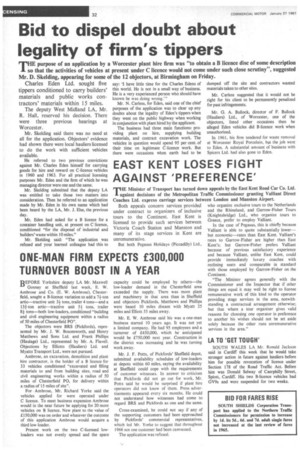Bid to dispel doubt about legality of firm's tippers
Page 34

If you've noticed an error in this article please click here to report it so we can fix it.
rTHE purpose of an application by a Worcester plant hire firm was "to obtain a B licence disc of some description so that the activities of vehicles at present under C licence would not come under such close scrutiny", suggested Mr. D. Skelding, appearing for some of the 12 objectors, at Birmingham on Friday.
Charles Eden Ltd. sought five tippers conditioned to carry builders' materials and public works contractors' materials within 15 miles.
The deputy West Midland LA, Mr. R. Hall, reserved his decision. There were three previous hearings at Worcester.
Mr. Skelding said there was no need at all for the application. Objectors' evidence had shown there were local hauliers licensed to do the work with sufficient vehicles
available.
He referred to two previous convictions against Mr. Charles Eden himself for carrying goods for hire and reward on C-licence vehicles in 1960 and 1963. For all practical licensing purposes Mr. Eden and the firm of which he was managing director were one and the same.
Mr. Skelding submitted that the deputy LA was entitled to take those two matters into consideration. Then he referred to an application made by Mr. Eden in his own name which had been heard by the LA, Mr. J. Else, the previous day.
Mr. Eden had asked for a B licence for a container handling unit, at present on C licence, conditioned "for the disposal of industrial and builders' waste within 10 miles."
Mr. Skelding said: "The application was refused and your learned colleague had this to say: 'I have little time for the Charles Edens of this world. He is not in a small way of business. He is a very experienced person who should have known he was doing wrong.'" Mr. N. Carless, for Eden, said one of the chief purposes of the application was to clear up any doubts about the legality of Eden's tippers when they went on the public highway when working in conjunction with plant hired by the applicant.
The business had three main functions: providing plant on hire, supplying building materials, and contract excavation work. The vehicles in question would spend 95 per cent. of their time on legitimate C-licence work. But there were occasions when earth had to be dumped off the site and contractors wanted materials taken to other sites.
Mr. Carless suggested that it would not be right for his client to be permanently penalized for past infringements.
Mr. G. A. Bullock, director of F. Bullock (Hauliers) Ltd., of Worcester, one of the objectors, listed other occasions then he alleged Eden vehicles did B-licence work when unauthorized.
In 1961, his firm tendered for waste removal at Worcester Royal Porcelain, but the job went to Eden. A substantial amount of business with Spicers Ltd. had also gone to Eden.












































































































